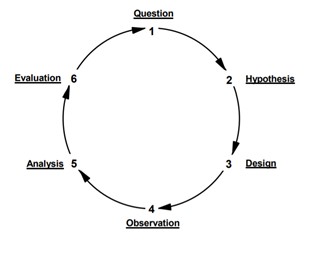1.4 Learning cycle in FFS and facilitation of the scientific attitude
Learning cycle in FFS and facilitation of the scientific attitude
Learning Outcomes:
- Describe concept of the FFS and its background.
- Prepare, integrate and conduct six steps of study for specialized courses in the field of the organic plant protection.
- Apply different matrixes for each steps aiming to support participants’ exploring and reflecting over their practices.
First, the facilitator must be aware that science is not reserved just for professional scientists. To facilitate scientific method enables farmers to learn about the basic principles and processes in their crop ecosystem. They do simple studies, compere treatments, and learn through their observations in the field. This approach (FFS) facilitates scientific attitude. Farmers learn to ask questions and a way to answer them.
Initial basic learning cycle aims to strengthen farmers’ skills and knowledge for critical analysis, to test and validate new practices and to assist in making informed decisions on field management. The learning process reinforces the understanding of complex ecological relations in the field. The learning cycle also aims to enhance participants’ group cohesion so that they can better work as a group, analyze questions or problem critically, draw on their own experience and observations and the experience and knowledge of others, create a consensus, and prepare for follow-up action once the learning cycle finishes.
The learning cycle below represents six essential steps in conducting a study. It resembles an experiential learning cycle adapted for use in field study (Figure 1.2). Experiential learning is relevant for agricultural extension since it provides a means to work with groups to find their own solutions to problems through testing and experimentation of ideas and practices which are closely related to their own everyday farming activities. This is relevant for study of methods aiming to support farmers’ exploring and reflecting over their practices, since farmers’ knowledge is by nature experiential.






